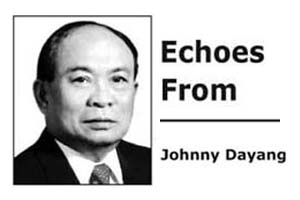BY JOHNNY DAYANG
*
AMID the noise generated by the closure of media network ABS-CBN, more weighty events, especially in jurisprudence, have been swept under the rug, foremost of which is the historical ruling issued by the US Supreme Court stating that any American president cannot invoke “absolute immunity” from criminal investigation while in office.
US Chief Justice John Roberts, who wrote the opinion, argued that “no citizen, not even the President, is categorically above the common duty to produce evidence when called upon in a criminal proceeding.” The value of this stance lies in the fact that our country’s High Tribunal invokes US rulings in legal queries without precedence in domestic laws.
The ramifications of the US SC ruling are multifarious. It strengthens the much-quoted bromide that “no one is above the law” and institutionalizes the public belief that immunity, like press freedom, is not complete but subject to certain restrictions.
While the US court’s ruling was triggered by a grand jury subpoena, this development will encourage the shift of the country’s judicial system to a faster justice system that requires magistrates to strictly resolve cases within the ambit of the rules of court.
The US ruling came out days after the local SC junked the petition seeking intervention to compel Malacañang to release the medical records of the President and inform the public of his true health. The petitioner invoked Section 12, Article VII of the 1987 Constitution, which states: “In case of serious illness of the President, the public shall be informed of the state of his health.”
The health of a head of state is an issue of paramount status to the people who elected him to office. Although in the US case the subpoena had something to do with the President’s business records, the same American ruling can be adopted in Philippine setting by allowing the filing of cases in matters with no direct impact on the official functions of the Chief Executive.
The protective mantle of immunity should not be invoked as an absolute shield. The Chief Executive must also be held accountable for past indiscretions committed prior to his stint as Chief Executive. The President’s oath of office demands faithful and conscientious compliance of duties, defense of the Constitution, execution of laws, carrying out justice to every man, and dedication to the service of the nation. Nowhere is it said that he is above the law.
* * *
PERSONAL: Heartfelt thanks to those who condoled with us in our hour of bereavement due to the passing of Ofelia Enriquez Dayang, my beloved wife, and mother of my children, Bernadette, Jed, and Princess. May God in His kindness extends to her eternal happiness.


